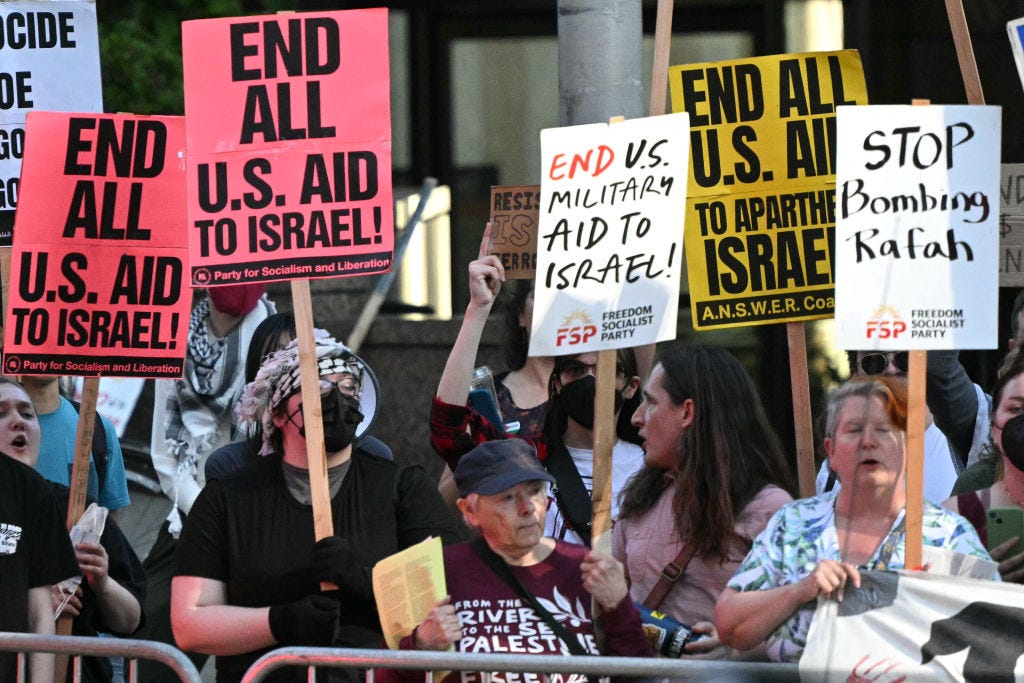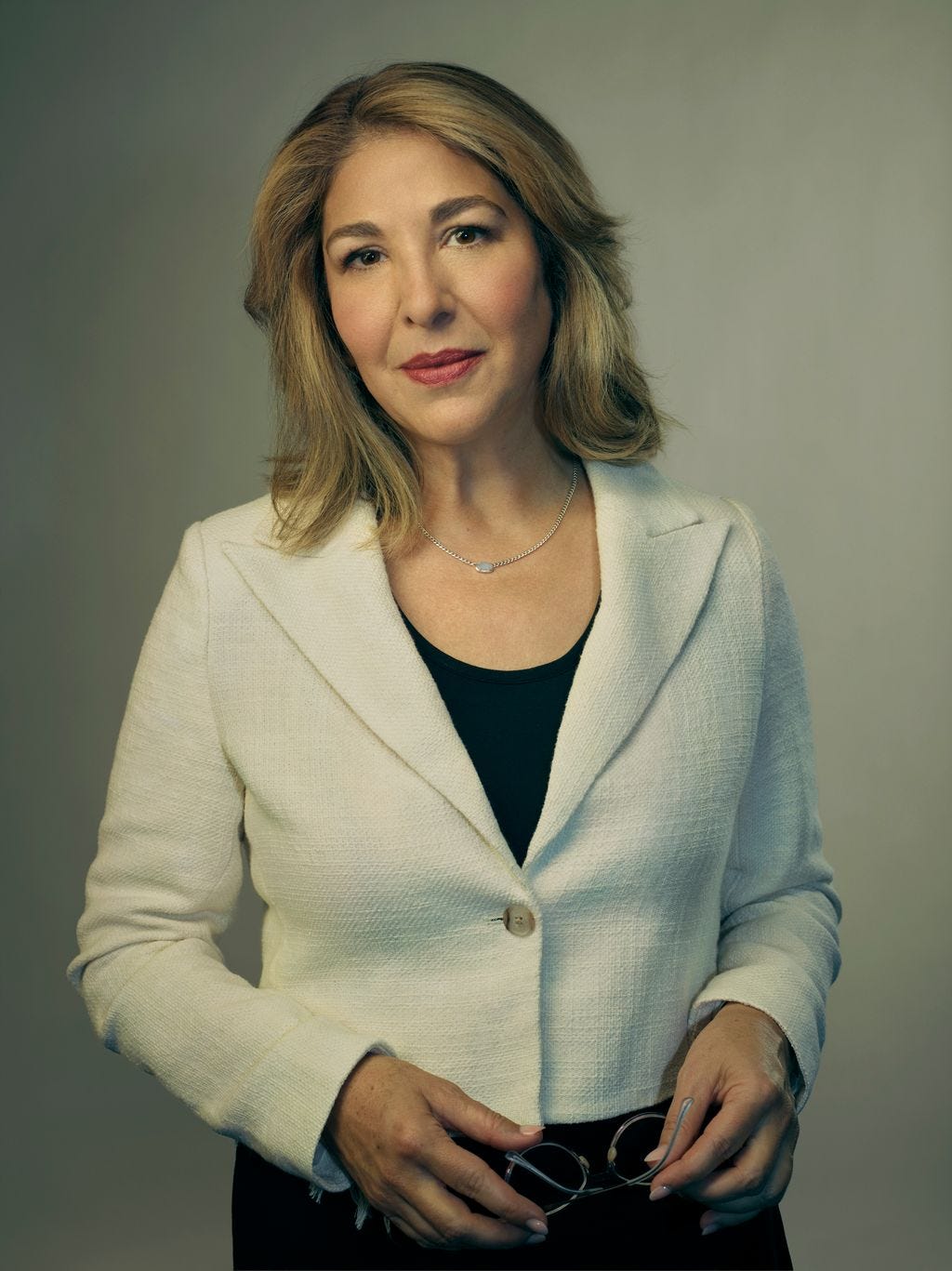INTERVIEW: Naomi Klein on Gaza and Israel, the use and misuse of trauma, and Biden’s future
Part two of our conversation with the author and activist
In the second part of our conversation with the author and activist Naomi Klein, we delve into the inner life of the ongoing war in Gaza, and the corrosive effect of that war on politics in Israel and the United States.
For Klein, the key to understanding the Gaza situation is this: The stories we are told about historical injustices — the Holocaust, most centrally in this case — can lock some people into a loop of unprocessed trauma that closes off further understanding and leads to simple solutions that repeat the mistakes of the past, even as others with similar history but different stories manage to avoid the loop.
Breaking out of those stories, Klein argued in our conversation, demands a radical openness to the stories of others, and a willingness to understand and process trauma instead of skipping directly to a happy ending — be that an ethnostate, or a fascist presidential candidate who promises to make things great again.
Klein has hope for the future and faith in the rising generation of young people, and she lays out a stirring vision of new stories that can be told, stories that could bring a genuine and durable peace to the Middle East. But she has also some very forceful words about the conduct of the war and about American complicity in it.
As with the first installment, you won’t want to miss this conversation. Whether or not you share her perspective, it’s one worth considering.
A request for those who haven’t yet joined us: The interviews and essays that we share here take research and editing and much more. We work hard, and we are eager to bring on more writers, more voices. But we need your help to keep this going. Join us today to support the kind of independent media you want to exist.
And today we’re offering you a special discount of 20 percent if you become a paying subscriber. You will lock in this lower price forever if you join us now!
I'm curious about the hardest and most meaningful conversations you're having within the Jewish community. With people who you respect and take most seriously and think are coming from a good place, but are really on a different angle than you on this topic. Take me inside some of those conversations.
It's very hard to have an actual conversation. It goes in a circle. And this is how you know it's coming from a place of trauma. What trauma does is you lose track of time and space. So if a soldier has PTSD, they hear a truck backfiring and they think they're back in Fallujah. That's what it means, a real trigger. It's a phrase that gets misused, but if it's being used diagnostically, this is what happens. You don't know where you are. You think you're somewhere else. You think you are still in the place of original danger.
I have family, friends, and people who I grew up with who are in Israel, members of my family. To be honest, my parents do more of the outreach than I do because I've been speaking out for so long that they've written me off. So my parents try to keep these doors open, and I get pulled into some of these conversations, but October 7th is the Holocaust. It's the truck backfiring.
It's also a trauma idea of justice as opposed to an idea of justice.
It's also all about unmetabolized trauma because trauma is instrumentalized. In the Jewish education that I grew up with, you learn about the Holocaust and you immediately pivot to “therefore Israel.” It's a phoenix from the flames, easy resolution. So you actually are not staying with the trauma. My friend V, formerly Eve Ensler, talks a lot about how if you want to transmute trauma and not just stay in this trauma loop where you become a victimizer or you just stay in this sort of trauma mindset, you actually have to stay in the trauma for a while. You can't just immediately instrumentalize it and say, "Okay. So here's the horror, but here's the happy ending.” We’ve got to stay.
The March of the Living, which takes thousands and thousands of people to Auschwitz every year, I don't know if you've seen the footage or know much about it, but you go to Auschwitz into the museum and you're just bathed in tears. And the people immediately get wrapped in the Israeli flag. There’ll be ceremonies with IDF soldiers and generals and the Israeli national anthem is sung. So you don't actually have time to sit with the trauma, to be in it before it becomes part of this other story, which is the story of an ethnostate.
So I actually think Zionism has a huge amount to teach the left about the problem of this kind of binary of victim-versus-victimizer, because Jews were in that moment, in the 1948 moment, both the biggest victims in the world — six million people had just been murdered — and were being passed this sort of mantle, this vision of justice, which is, "Okay, so now it's your turn. Now you get to do the whitest thing in the world, which is cleanse the land of its indigenous inhabitants and have an ethnostate."
And now if you look at what Israel has become and what it stands for to the far right around the world, why it has support from all of these far-right figures who are using it. For me, there's a particular kind of horror in watching not only what Israel is doing in Gaza, but what Israel is doing for the far right in Europe, in Germany, in France, in Italy, where these far-right politicians are cleansing their image by "standing with Israel” and against anti-Semitism and pivoting to the Muslim other. So that's the new Jew.
It's a heavy time, but I feel like if we don't understand this dynamic of how kind of victim culture can go wrong, we will be in this endlessly replicating loop.
It's a rotation of the personnel, not of the dynamic.
Switching places. And to me, that's the kind of shallowest and most dangerous form of identity politics.





